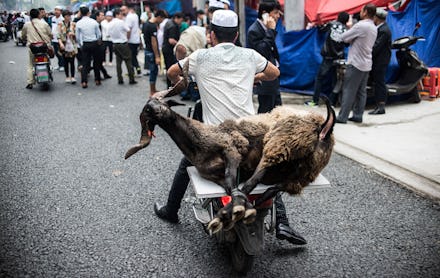A look inside Eid al-Adha in China, where 23M Muslims are considered the minority

On Monday, Muslims around the world observe Eid al-Adha, an important holiday of Islam. Not to be confused with Eid al-Fitr, which celebrates the conclusion of the month-long fast of Ramadan, Eid al-Adha is also known as the Feast of the Sacrifice, as CNN noted. The day brings the Muslim community together to celebrate with prayer and lots of feasting on meaty dishes.
The holiday commemorates God's test of Ibrahim, who is known as the Abraham in the Bible and the Torah. According to the Quran, God came to Ibrahim in a dream and commanded him to kill his son "as an act of obedience," CNN wrote. Just as he was about to follow through with the sacrifice, God gave him a sheep to slaughter instead.
To honor this, Muslims who can afford to do so, purchase livestock like sheep, lamb or cattle to sacrifice, Food Republic noted. Part of the meat is cooked by the family that purchased the animal and the rest of it is donated to those in need.
There are at least 1.6 billion Muslims in the world, and while many of the pillars of the celebration remain the same, Eid al-Adha is commemorated differently in various parts of the globe. More than 23 million Muslims live in China, where they are considered to be a minority. But Eid al-Adha "is the one time of the year that Muslims can really take over public space," photographer Liz Hingley, who spent 2013 and 2015 photographing Eid al-Adha celebration in Shanghai, said in an email. For example, the Huxi Mosque in Shanghai, white carpets are rolled out into the main streets to "accommodate the overflowing devotees," she said.
The public celebration of Eid al-Adha is especially poignant in Shanghai, because of ongoing debates in China over the validity of halal food, Hingley added. "Debates have arisen numerous times on Chinese social media about the necessity or not to enact legislation on halal food standards, as some Chinese food producers have been known to label non-halal food as halal." So Muslims being able to sacrifice the sheep in a halal manner — maintaining a halal diet is a key component to Islam — in public outside of a mosque is very symbolic, Hingley said.
Food is central to the Eid al-Adha celebrations in Shanghai. During the holiday, food vendors line up outside the various mosques of the city selling things like mutton soup and noodles, Hingley said.
But the real star of the day is the sheep that gets scarified. Hingley recalls watching a group of men drag a freshly slaughtered sheep down the street from the men's building of the Xiaotaoyuan Mosque to the women's building after prayers. A group of women then spent "over 30 minutes hacking it to pieces on an old cardboard box," she said. All revelers nearby were then invited to feast on the "spiritually sustaining" soup they made from the meat.
Below, a look at Eid al-Adha in Shanghai through Hingley's lens: